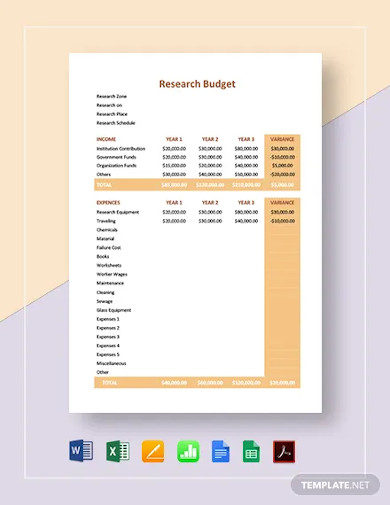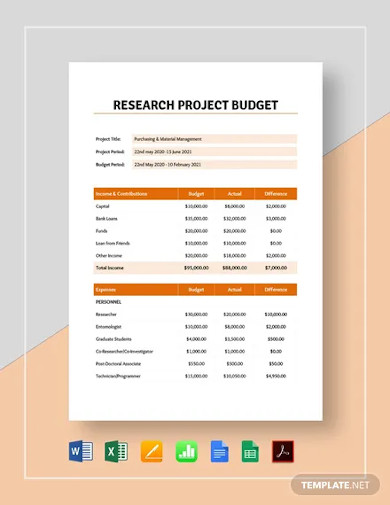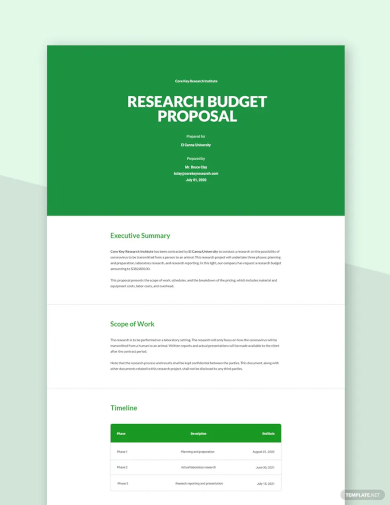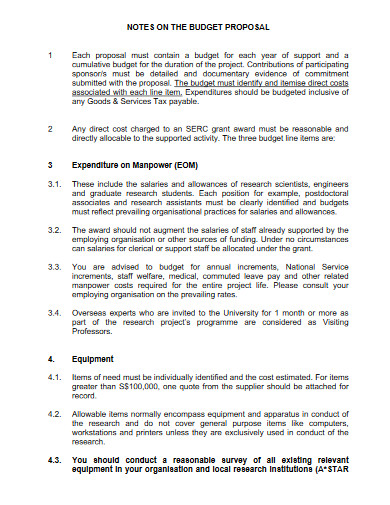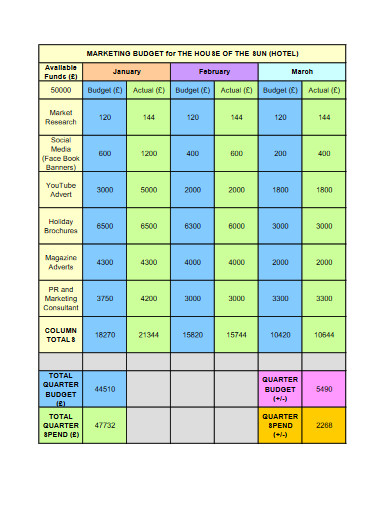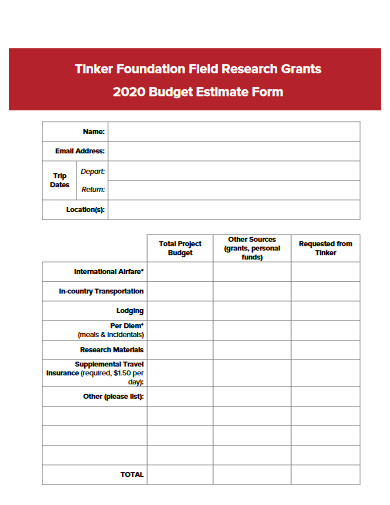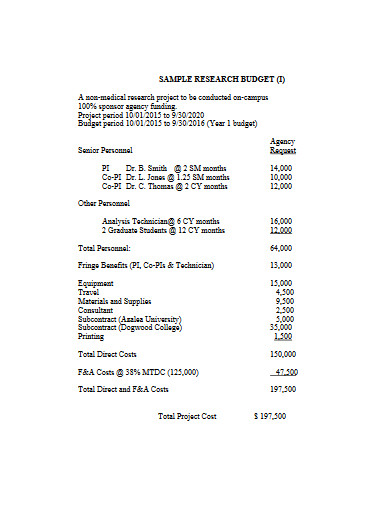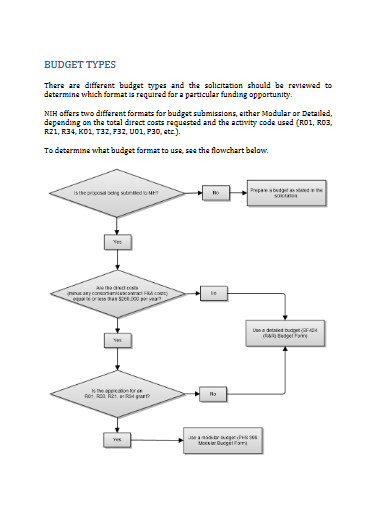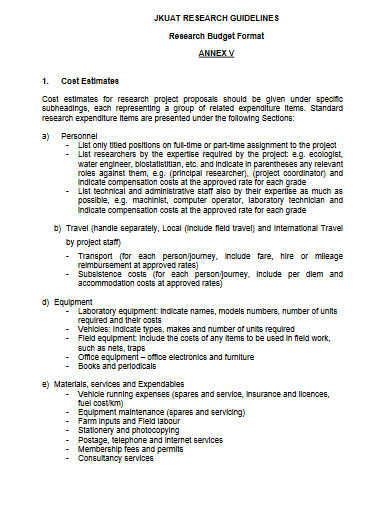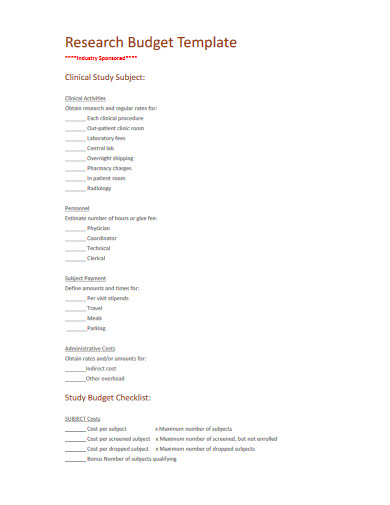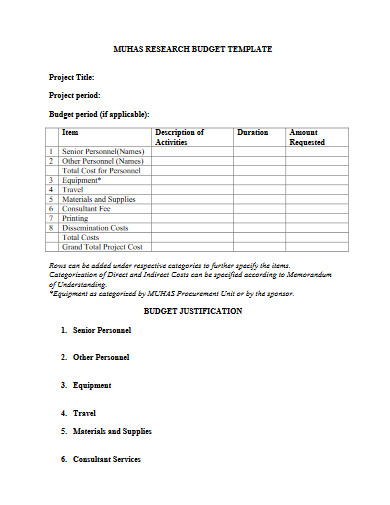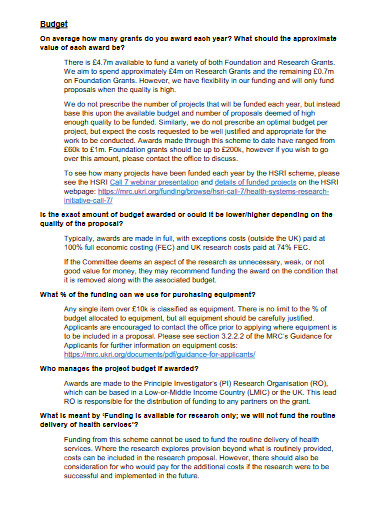11+ Research Budget Examples to Download
Research is highly necessary for a business simply because it helps the company understand the customers, competitors, and the market, in general. The data that the project’s processes bring can make way for the development of company operations. However, all these benefits do not come cheap. Most companies, especially the startups, would even submit proposals to request grants from federal agencies, loans from banks, and investments from other fund sources. To successfully acquire financial assistance for their quantitative or qualitative research, it is necessary to produce a research budget document. If by any chance, you are planning to create such a document, our article and variety of examples can assist you! Check them out below!
11+ Research Budget Examples
1. Research Budget Template
2. Research Project Budget Template
3. Research Budget Proposal Template
4. Research Budget Proposal
5. Marketing Research Budget
6. Research Budget Estimate Form
7. Sample Research Budget
8. Budget Research Proposal
9. Research Budget Format
10. Simple Research Budget Template
11. Project Research Budget Template
12. Research Budget in PDF
What Is a Research Budget?
A research budget is the breakdown of the estimated income and expenses of a certain research project. According to MyMoneyCoach, budgeting lets individuals and organizations ascertain whether the financial resources are enough to complete a project. Additionally, if the said resources fall short, the process will help them prioritize the much-needed things or activities. Often, people use the term budgets for estimates. Unarguably, most of their elements are alike. The only difference is that budgets highlight how much money is up for spending. At the same time, estimates are predictions of how much money is needed to buy certain things or perform certain activities.
Research: Expensive or Not?
Some entrepreneurs do not know how advantageous research is for their businesses. Upon hearing about business research, the most common question that comes to their mind is whether such an undertaking is expensive or not. Sad to say, the answer is indefinite because its cost will vary depending on your expertise about the subject.
Firms who are not confident enough of their knowledge and experience in business research can hire research companies that can do the job for them. Doing so will approximately cost them USD 1,500 to $30,000, depending on how big the job is. On the contrary, corporate entities who are knowledgeable about the idea of business research can do it by themselves with a little guidance of online sources and other sorts of reference. The cost for it can go down from USD 100 up to USD 5,000.
How To Create a Research Budget
Considering that budgeting involves numbers and figures, you have to be delicate not just to them but also to the itemized entries. Moreover, each of its sections has to comply with the standards to ensure its completeness. By our own research, we are confident that our outline of the necessary guidelines below can help you in making your research budget without any hassle.
1. Describe Research Goals and Objectives
Generally, the research’s main function is to help improve an organization’s workplace operation and the company’s market standing. To effectively set and acquire the necessities for the undertaking, you need to have a better understanding of its specific goals and objectives. Hence, you have to describe them first and foremost.
2. Set the Research Methodology
There are many ways to gather and interpret data for your research. Each of them requires specific materials and equipment, which obviously have a monetary value. Most researchers commonly utilize participant observation, survey methodology, in-person interviews, focus groups, experimental research, secondary data analysis, and mixed methods as their techniques.
3. Specify Target Audience
The target audience is a good basis for your budget. Its volume and demographic can determine how much money you will need for the provision of research materials, such as survey questionnaires and survey forms. For example, if you’re targeting an audience of 10 to 15 people aged 50 to 60, the cost is surely expensive. Most of these people are probably in a nursing home. Aside from preparing them tokens for their participation, you also have to spend some dimes getting into the nursing home, like transportation and the creation of permission slips.
4. Calculate Income
After specifying your target audience, calculate your research’s overall income. Include in your calculations the allotment of your research’s financial assistance. Also, you have to indicate where these funds come from. The total income will be the very foundation of your budget.
5. Reckon Expenditures
Now that you have your income already set, create a list of all the items that you need to spend on. With your income as your basis, distribute the funds according to your priorities to ensure the inclusion of important things or activities, while delaying or eliminating the unnecessary ones.
6. Review
Once you have successfully set every detail, don’t forget to review each of them one more time. With money at stake, misspellings, miscalculations, and other faults should have no room in your budget. By reviewing your budget before finalizing, you allow yourself to make your data accurate, which is a very crucial quality for research.
FAQs:
What do you mean by the direct and indirect costs of budgeting?
Direct costs refer to the expenses to produce goods or provide services, while indirect costs describe the necessary expenditures for the continuity of business operations.
What are some of the biggest disadvantages of business research?
1. Just like any other type of research, business research is time-consuming.
2. Due to the fast-changing markets, the results of business research can easily become out of date.
3. The business research’s respondents have chances of becoming biased, putting your entire project at risk of having inaccurate information.
What are the phases of budgeting?
Budgeting has five phases. They include preparation and formulation, approval, execution, revision, and control.
American filmmaker, anthropologist, and author Zora Neale Hurston once said, “Research is formalized curiosity. It is poking and prying with a purpose”, and she is right. Through it, we unravel things we never knew we had, whether they’re good news or bad ones. Either way, the discovery of these things can lead to improvement. Funding research is, absolutely, a good idea. However, businesses can only give so much. Some don’t even have anything to offer at all, risking themselves to rely on loans. Because of these facts, researchers have to learn the process of budgeting, as well as their advantages and disadvantages.



